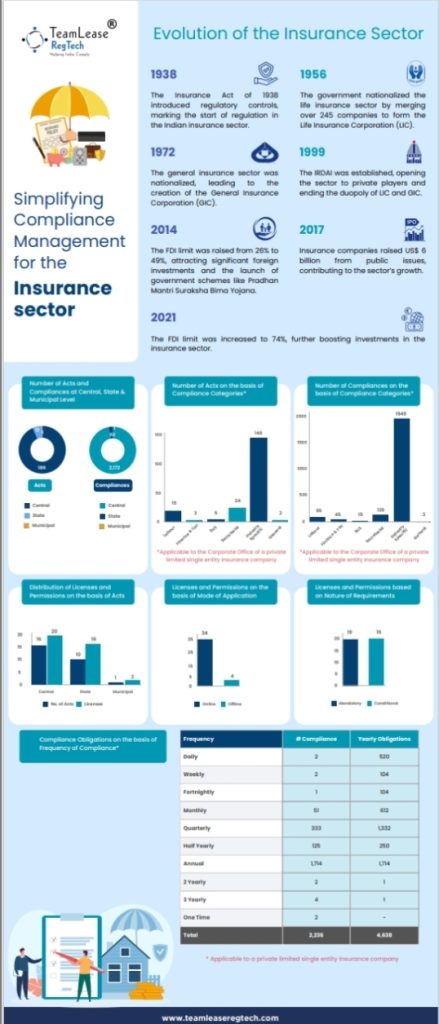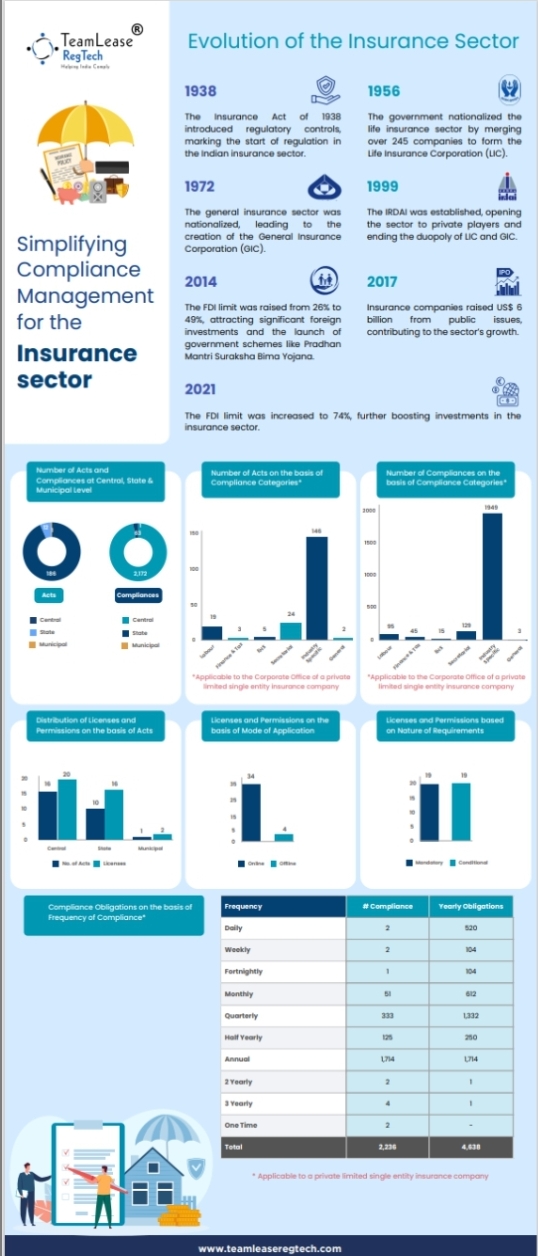How Compliance Automation Enhances Customer Experience in the Insurance Sector
Let us understand the importance of compliance automation in insurance sector. The insurance industry in India has grown rapidly over the past two decades. With a 17% compound annual growth rate (CAGR), it is expected to reach $222 billion by 2026. However, as the industry expands, compliance obligations also increase significantly. A single-entity insurance company operating in one state must manage 2,236 unique compliances. When compliance frequency is considered, the number rises to 4,638 per year. This complex regulatory environment creates challenges that impact both insurers and their customers.
The Burden of Compliance on Insurers
Insurance companies must comply with various regulations at the central, state, and municipal levels. They also need 38 licenses and approvals under 27 different acts. These requirements increase administrative burdens, slow down processes, and divert resources from customer service initiatives. Many insurers still rely on outdated compliance tracking methods like Excel sheets, which are prone to errors and inefficiencies. As a result, compliance management becomes reactive rather than proactive. That generates the serious initiative towards compliance automation.
How Compliance Complexity Impacts Customer Experience
Compliance challenges do not just affect insurance companies; they also impact policyholders in several ways. Firstly, compliance-related delays can slow down claims processing. When companies struggle to manage regulatory requirements efficiently, customers experience long wait times for approvals. Secondly, regulatory non-compliance can lead to penalties, forcing insurers to raise premiums to offset costs. Ultimately, customers pay the price for inefficient compliance management.
Moreover, regulatory gaps can expose customers to financial risks. Without proper compliance, insurers may fail to protect customer data, increasing the chances of fraud and data breaches. In contrast, a well-structured compliance system with an intelligent compliance automation strengthens security and enhances customer confidence in insurance providers.
The Shift Towards Compliance Automation
To address these challenges, insurance companies are turning to compliance automation. Automation helps insurers manage regulations efficiently, reducing human error and improving overall compliance rates. By implementing technology-driven solutions, insurers can track compliance requirements in real time. This shift allows them to focus more on customer service and innovation rather than regulatory hassles.
Benefits of Compliance Automation for Customers
1. Faster Claims Processing
A major customer pain point in the insurance industry is claim settlement delays. Manual compliance processes often cause bottlenecks, prolonging claim approvals. Automated compliance systems streamline regulatory checks, ensuring faster claim settlements. As a result, customers experience a smoother, hassle-free claims process.
2. Increased Transparency and Trust
Customers expect clear communication and transparency from their insurers. Automated compliance systems ensure that companies follow regulations consistently. This reduces the risk of unfair practices and increases trust among policyholders. When customers feel secure, they are more likely to remain loyal to an insurer.
3. Enhanced Policyholder Protection
Regulatory compliance plays a crucial role in safeguarding policyholders. Strict adherence to solvency margin requirements ensures that insurers have sufficient funds to pay claims. Compliance automation helps insurers meet these financial regulations accurately, reducing the risk of insolvency. Consequently, customers benefit from stronger financial protection.
4. Improved Customer Support
When insurers spend less time on manual compliance tasks, they can invest more resources in enhancing customer support. Automation frees up teams to focus on personalized customer interactions. This leads to faster query resolution and improved service quality, enhancing the overall customer experience.
The Role of Regulatory Technology (RegTech)
Regulatory technology, or RegTech, plays a significant role in compliance automation. RegTech solutions help insurers manage complex regulations efficiently. These cloud-based systems track regulatory changes, automate reporting, and ensure timely compliance. By leveraging artificial intelligence (AI) and machine learning, RegTech platforms predict potential compliance risks and alert insurers in advance. This proactive approach minimizes regulatory violations and enhances customer trust.
Encouraging a Compliance-Driven Culture
While automation is essential, it must be accompanied by a strong compliance culture. Leadership teams should prioritize compliance management and integrate it into their organizational strategy. When compliance becomes a core value, insurers can align their operations with regulatory requirements seamlessly. This approach not only mitigates risks but also improves customer satisfaction.
The Future of Compliance in Insurance
As India’s insurance sector continues to grow, regulatory demands will become more stringent. Insurers must adopt digital-first compliance strategies to remain competitive. The shift towards a cashless, paperless, and presenceless economy necessitates automation in every aspect of the insurance business. By embracing RegTech, insurers can enhance efficiency, reduce costs, and deliver superior customer experiences.

Conclusion
The insurance sector faces an increasingly complex regulatory landscape. Managing thousands of compliance requirements manually is no longer sustainable. Compliance automation offers a transformative solution that benefits both insurers and customers. Faster claims processing, enhanced transparency, and improved policyholder protection make compliance automation a game-changer. By investing in RegTech and fostering a compliance-driven culture, insurers can build trust, streamline operations, and ultimately create a better experience for their customers.

